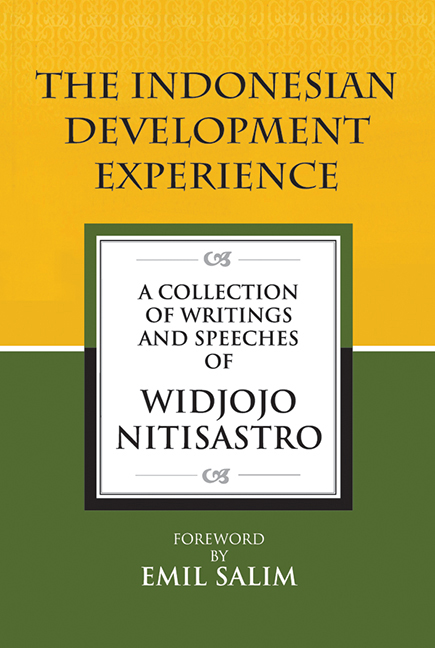Book contents
- Frontmatter
- Dedication
- Frontispiece
- Contents
- Foreword
- Introduction
- Part I PLANNING OF INDONESIA'S DEVELOPMENT
- Part II IMPLEMENTATION OF INDONESIA'S DEVELOPMENT
- 9 Progress and Challenges of Indonesia's Development (1990)
- 10 Some Features of Indonesia's Economic Development During the Last Twenty-Five Years (1993)
- 11 Oil and the Indonesian Economy (1985)
- 12 Making Tough and Painful Decisions (1991)
- 13 Responding to Various Development Proposals (1997)
- Part III FACING VARIOUS ECONOMIC CRISES
- Part IV SETTLEMENT OF FOREIGN DEBT
- Part V EQUITABLE DEVELOPMENT
- Part VI INDONESIA AND THE WORLD
- Index
- About the Author
11 - Oil and the Indonesian Economy (1985)
from Part II - IMPLEMENTATION OF INDONESIA'S DEVELOPMENT
Published online by Cambridge University Press: 21 October 2015
- Frontmatter
- Dedication
- Frontispiece
- Contents
- Foreword
- Introduction
- Part I PLANNING OF INDONESIA'S DEVELOPMENT
- Part II IMPLEMENTATION OF INDONESIA'S DEVELOPMENT
- 9 Progress and Challenges of Indonesia's Development (1990)
- 10 Some Features of Indonesia's Economic Development During the Last Twenty-Five Years (1993)
- 11 Oil and the Indonesian Economy (1985)
- 12 Making Tough and Painful Decisions (1991)
- 13 Responding to Various Development Proposals (1997)
- Part III FACING VARIOUS ECONOMIC CRISES
- Part IV SETTLEMENT OF FOREIGN DEBT
- Part V EQUITABLE DEVELOPMENT
- Part VI INDONESIA AND THE WORLD
- Index
- About the Author
Summary
Introductory Note: The Indonesian Petroleum Association invited me to give an address at its convention commemorating the centennial of the oil industry in Indonesia on 8 October 1985. In the address I pointed out that: “Compared to many countries in the world Indonesia is indeed blessed with an abundance of natural resources. Rich natural resource endowments, however, are no guarantee for rapid economic growth.… Only with the proper policy mix will the availability of abundant natural resources provide a strong base for a strong growth of a country's economy. ” I then referred to the sharp increases of oil prices in the seventies which led to rapid expansion in investment in the public as well as private sectors. I also highlighted a set of adverse conditions in the oil market that had forced the government to take the following measures: a steep devaluation of the currency coupled with a flexible exchange rate management policy to maintain our external competitive edge; reassessment of government expenditure that resulted in a US$10 billion rescue; extensive reform of the banking sector resulting in rapid growth of domestic savings; major reform of the tax system to mobilize domestic non-oil resources; sweeping reforms in customs, shipping, and harbour management to strengthen the non-oil export drive.
The present convention of the Indonesian Petroleum Association is of special importance since today we commemorate the centennial of the oil industry in Indonesia. Permit me on this memorable occasion to express my congratulations to all of you for your participation in the successful development of the country's natural resources into an industry of utmost importance for furthering the nation's development goals.
Compared to many countries in the world Indonesia is indeed blessed with an abundance of natural resources. Rich natural resource endowments, however, are no guarantee for rapid economic growth. Moreover, a number of countries with limited natural resources have been very successful in their development efforts. Only with the proper policy mix will the availability of abundant natural resources provide a strong base for a sustained growth of a country's economy. In this respect Indonesia is a case in point. At present oil and gas in Indonesia play a crucial role in bringing about a broad based pattern of sustained economic development. Annually about 60 to 70 per cent of total foreign exchange earnings as well as budgetary revenues originate from oil and gas.
- Type
- Chapter
- Information
- The Indonesian Development ExperienceA Collection of Writings and Speeches, pp. 135 - 138Publisher: ISEAS–Yusof Ishak InstitutePrint publication year: 2011



